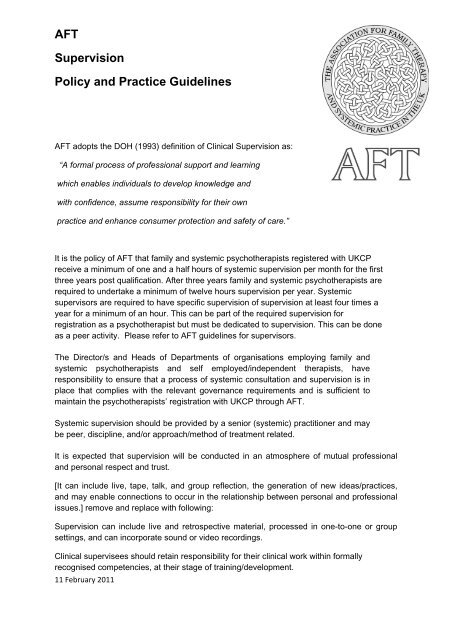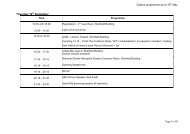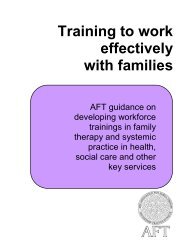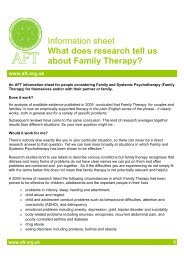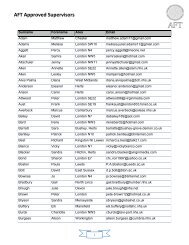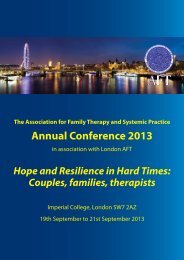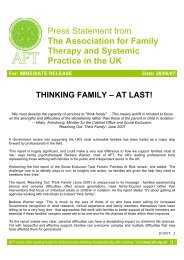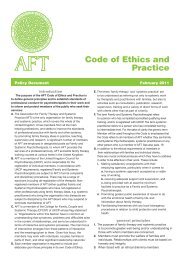Clinical supervision policy - AFT
Clinical supervision policy - AFT
Clinical supervision policy - AFT
You also want an ePaper? Increase the reach of your titles
YUMPU automatically turns print PDFs into web optimized ePapers that Google loves.
<strong>AFT</strong><br />
Supervision<br />
Policy and Practice Guidelines<br />
<strong>AFT</strong> adopts the DOH (1993) definition of <strong>Clinical</strong> Supervision as:<br />
“A formal process of professional support and learning<br />
which enables individuals to develop knowledge and<br />
with confidence, assume responsibility for their own<br />
practice and enhance consumer protection and safety of care.”<br />
It is the <strong>policy</strong> of <strong>AFT</strong> that family and systemic psychotherapists registered with UKCP<br />
receive a minimum of one and a half hours of systemic <strong>supervision</strong> per month for the first<br />
three years post qualification. After three years family and systemic psychotherapists are<br />
required to undertake a minimum of twelve hours <strong>supervision</strong> per year. Systemic<br />
supervisors are required to have specific <strong>supervision</strong> of <strong>supervision</strong> at least four times a<br />
year for a minimum of an hour. This can be part of the required <strong>supervision</strong> for<br />
registration as a psychotherapist but must be dedicated to <strong>supervision</strong>. This can be done<br />
as a peer activity. Please refer to <strong>AFT</strong> guidelines for supervisors.<br />
The Director/s and Heads of Departments of organisations employing family and<br />
systemic psychotherapists and self employed/independent therapists, have<br />
responsibility to ensure that a process of systemic consultation and <strong>supervision</strong> is in<br />
place that complies with the relevant governance requirements and is sufficient to<br />
maintain the psychotherapists’ registration with UKCP through <strong>AFT</strong>.<br />
Systemic <strong>supervision</strong> should be provided by a senior (systemic) practitioner and may<br />
be peer, discipline, and/or approach/method of treatment related.<br />
It is expected that <strong>supervision</strong> will be conducted in an atmosphere of mutual professional<br />
and personal respect and trust.<br />
[It can include live, tape, talk, and group reflection, the generation of new ideas/practices,<br />
and may enable connections to occur in the relationship between personal and professional<br />
issues.] remove and replace with following:<br />
Supervision can include live and retrospective material, processed in one-to-one or group<br />
settings, and can incorporate sound or video recordings.<br />
<strong>Clinical</strong> supervisees should retain responsibility for their clinical work within formally<br />
recognised competencies, at their stage of training/development.<br />
11 February 2011
These guidelines are broadly drawn for application to a variety of <strong>supervision</strong> contexts. They<br />
can be supplemented by local protocols and procedures where, for example; the supervisor<br />
is the supervisee’s line manager, the supervisor works in the same organisation, or the<br />
supervisor is externally contracted.<br />
In the event of a complaint; the organisation or individual practitioner should use the<br />
complaints <strong>policy</strong> as appropriate.<br />
Guidelines for <strong>supervision</strong> contracts<br />
• the context of <strong>supervision</strong> ('line management', consultation external to the employing<br />
organisation, etc.)<br />
• regularity and timing of <strong>supervision</strong><br />
• cancellations<br />
• cost and arrangements for payment<br />
• which parts of the supervisee's working life are, and are not, included within the<br />
scope of the contract<br />
• recording of <strong>supervision</strong><br />
• confidentiality<br />
• all forms of dual relationship<br />
• management of concerns about clinical risk and quality of clinical practice<br />
• learning and/or support needs that the supervisee feels need particular attention<br />
• areas in which the supervisor may feel less competent, and might advise that the<br />
supervisee seeks alternate sources of consultation<br />
• whether and how the self of the supervisor and the self of the supervisee can be<br />
discussed<br />
• how the supervisory relationship itself can be discussed<br />
• timing of a review of the contract<br />
• Agree a third party that can be called upon if the supervisory relationship were to get<br />
into difficulty<br />
Supervisee Responsibilities<br />
• To actively address issues of power and difference in therapeutic relationships and in<br />
the supervisory relationship.<br />
• To participate in creating the <strong>supervision</strong> contract.<br />
• To prepare for <strong>supervision</strong> by identifying good practice, practice dilemmas, areas of<br />
difficulty and by reflecting on the personal impact of practice.<br />
• To agree an agenda for each session with the supervisor<br />
• To use the <strong>supervision</strong> sessions constructively to enhance their learning and<br />
practice, by being open to discussion, co-creation of ideas, and constructive<br />
feedback.<br />
• To maintain professional standards of confidentiality.<br />
• To ensure issues of ‘risk’ pertaining to specific clients are actively considered.<br />
• To openly address difficulties that may arise in the relationship at an early stage.<br />
• To ensure their practice is consistent with professional codes of practice and ethical<br />
guidelines for clinicians.<br />
Supervisor Responsibilities<br />
• To actively address issues of power and difference in therapeutic<br />
relationships and in the supervisory relationship.<br />
11 February 2011
• To ensure a safe, confidential environment for consultation and <strong>supervision</strong><br />
and to provide this in a manner that is consistent with professional codes of<br />
practice and ethical guidelines.<br />
• To create a <strong>supervision</strong> contract that includes regulatory (normative), developmental<br />
(formative), and supportive (restorative) elements appropriate to the particular<br />
context of the <strong>supervision</strong>. The contract should be clear about purpose and<br />
boundaries, mutually agreed and be open to periodic revision (usually annually).<br />
Lines of management and clinical responsibility appropriate to the context should be<br />
clearly stated.<br />
• To agree an agenda for each session with the supervisee<br />
• To be active in creating a supportive and facilitative supervisory relationship in which<br />
constructive feedback can be given and received.<br />
• Be aware of supervisee’s developing level of competence, and tailor <strong>supervision</strong><br />
accordingly, enhancing the supervisee’s ability to explore issues, clarify their own<br />
thinking, feelings and assumptions, and reflect on their practice.<br />
• To ensure issues of ‘risk’ pertaining to specific clients are actively considered.<br />
• To address personal issues in so far as they may interfere with or be affected by the<br />
clinical work, and not to enter into a personal counselling relationship with the<br />
supervisee.<br />
• To challenge practice which (s)he considers unethical, unprofessional, and/or<br />
incompetent and to keep the employing agency appraised of any serious concerns<br />
regarding the supervisee’s practice. For concerns regarding psychotherapists in<br />
private practice the supervisor has an ethical responsibility to seek advice regarding<br />
possible courses of action<br />
• To maintain an accurate record (including recording any disagreements) of each<br />
<strong>supervision</strong> session. Records should be agreed with the supervisee, signed by both<br />
parties and stored securely.<br />
• To maintain and promote professional standards of confidentiality.<br />
• To openly address difficulties that may arise in the relationship at an early stage.<br />
• To initiate periodic review of supervisory relationship.<br />
• To pursue their own continuing professional development (CPD) in order to be able<br />
to work in the best interests of the supervisee.<br />
Please also see the <strong>AFT</strong> website www.aft.org.uk for:<br />
<strong>AFT</strong> Continuing Professional Development Policy<br />
<strong>AFT</strong> Code of Ethics and Practice for Supervisors 2010<br />
<strong>AFT</strong> Complaints and Disciplinary Procedure<br />
11 February 2011


